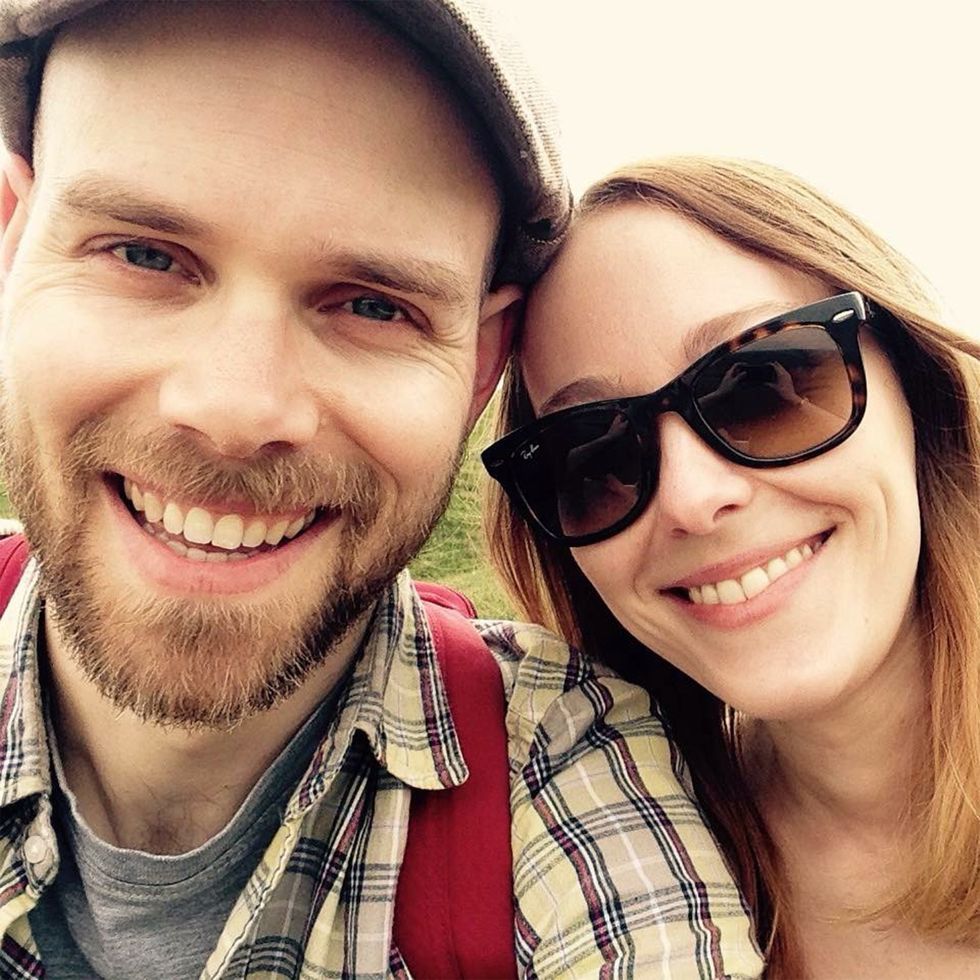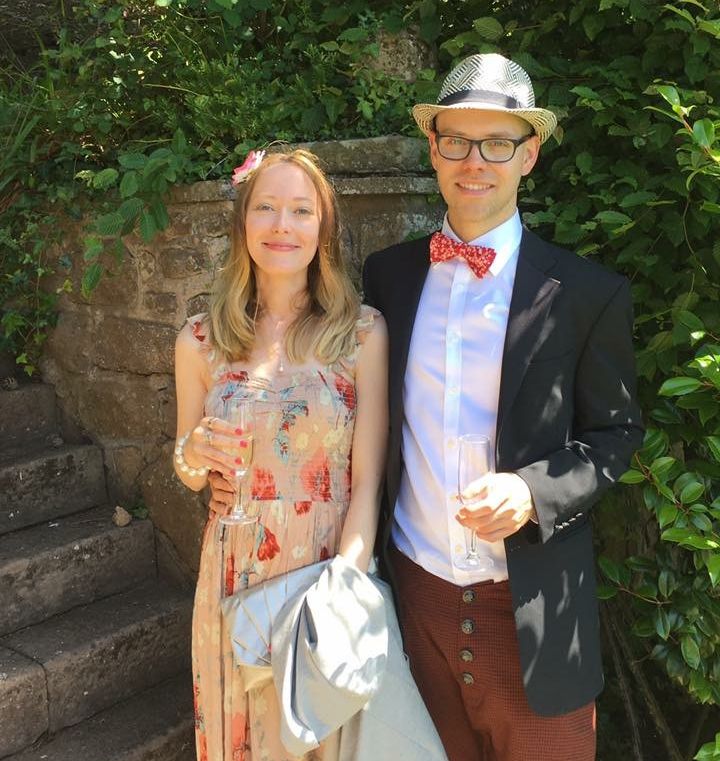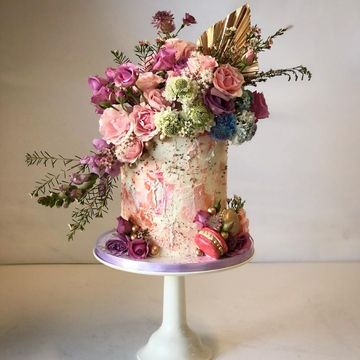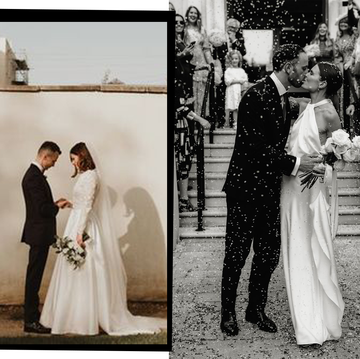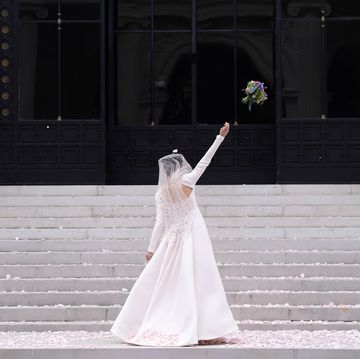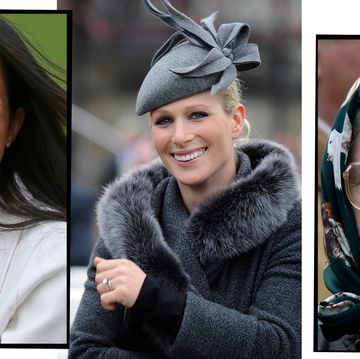A
t the beginning of October, Theresa May announced that straight couples will soon be able to enter civil partnerships, a right that has been reserved for same-sex couples until now. The landmark decision came three months after the Supreme Court ruled that allowing only same-sex couples to enter a civil partnership was discriminatory.
For Londoners Amy, 33, and Ben, 36, the news couldn't have come soon enough. The couple, who have been together for six years after meeting at work, have been supporting the Equal Civil Partnerships campaign to extend the right to straight couples with the hope of entering this union themselves.
'I was at work when I found out [about May's announcement] and I was just so happy and in floods of tears,’ Amy - a digital content manager - tells ELLE UK. ‘It was actually really embarrassing but all my colleagues are so supportive. They were all giving me hugs and asking about it. Me and Ben went out for cocktails in the evening to celebrate.'
Currently, only same-sex couples in the UK are allowed a civil partnership - which essentially gives a couple legal recognition and the same rights as married couples. It’s a pretty simple process - the couple must give notice of their intention to register a civil partnership (and complete relative identification checks). Then, the partners sign a document in front of two witnesses and a registrar at least one month later at any registry office.
This form of civil union was first introduced in the UK in 2004, when gay marriage wasn't yet legal, but since this was legalised in 2014, same-sex couples can still choose whether to marry or have a civil partnership. The only option for mixed-sex couples is marriage.
For Amy and Ben, this presented a problem. Soon after their relationship became more than just dating, the inevitable chat around 'where is this going?' came up. While they were both happy, in love and committed to a future together, Amy and Ben made it clear that they didn’t see themselves as the ‘husband and wife’ type.
'Neither of us had ever really been comfortable with the idea of marriage and didn’t really see ourselves as "husband and wife," Amy says. 'We were quite committed to each other from early on, we just assumed we’d carry on living together, stay committed to each other and just remain unmarried.'
This is not uncommon. According to the most recent figures from the Office of National Statistics, one in ten people living in a couple having never been married. What's more, the ONS say the most recent marriage rates are the lowest on record, having been steadily declining since the early 1970s. The single and never-married population over the age of 16 in England and Wales has increased by 3.9 million people from 2002 to 2017, while the number of married people has only increased by 1.2 million over the same period of time.
For Amy, it’s the traditions surrounding marriage, particularly in a religious ceremony, that aren't the right fit.
'It’s the history of marriage, the religious association and the patriarchal association with it being more like an economic transaction in the past,' she explains. 'You can still see it in some of the traditions we have today like giving the bride away and it only being the father's name on the marriage certificate - that just doesn't fit well with me.
'Ben’s reasons are very similar to mine,’ she adds. ‘It's nothing to do with commitment, just the traditions and history of it. We both see ourselves as feminists, so it’s tied up in that too.'
While marriage was off the cards for this couple, a lifelong allegiance to each other was not. Having bought a house together a year ago, they have recently made a significant financial commitment to their future together. However, both Amy and Ben have always been aware that remaining unmarried would make it difficult to access some of the advantages married couples enjoy, like pension plans, tax breaks and automatic inheritance.
Although the couple are not planning to have children at the moment, 'the door is open for the future', So, the idea of security has become even more important. When they 'stumbled' upon the campaign to extend civil partnerships to mixed-sex couples on Twitter, they instantly thought this form of legal union suited their needs.
'I first heard about it about two years ago,' Amy says. 'I thought it sounded really interesting and I really agreed with all the points they were making on their website. It felt like they were making progress and that it was worth waiting for to see whether it would come through for us.'
Since Amy and Ben discovered that they could go ahead with their civil partnership, the reaction from friends and family has been mixed. Amy says most of their loved ones have always fully backed their choice, but it took a bit longer for others to get on board with.
'A couple of people have initially not understood where we are coming from. Because they are married themselves, they took it as a little bit of a criticism of what they’d decided to do. As soon as we explained to them that we’re actually really supportive of people who want to get married but a civil partnership feels like a better fit for us, they understood.'
As for the response from society, Amy thinks there's a bit of a split: 'Some people completely get it and they’re happy for those people who do want one. They understand it doesn’t affect or have any impact on them if they disagree or still want to get married. But others see it as a fuss over nothing and say: ‘Why don’t you just get married, it’s not that bigger deal?’
The next steps for Amy and Ben are in the hands of the government. Though the Prime Minister has announced there will be a change in law, it still needs to go through a parliamentary process and no timeline for this has been indicated as yet.
'We’re really hoping now the government will attach some dates to it,' Amy adds. 'They’ve said it’s going to happen but we have no idea of when it was actually come into law, but when it does, we’ll go to a registry office and get it sorted. We definitely want to be one of the first couples to get a civil partnership. We’re really keen.'
Whenever the change does come into effect, Amy is sure that although they're not adhering to a traditional marriage (or meeting the ever increasing cost of a standard ceremony), they will be throwing one hell of a party.
'We'll just sign the document - skipping out on a ceremony - and then have a big party with all our friends and family. We've been planning it in our minds for the last year or so. We're very excited about it.’
The party will take the form of more of a birthday celebration than a wedding breakfast. No white dress, no Father of the Bride speeches or a three-tiered cake. Instead, there will be food, dancing, drinking and maybe a joint speech from the couple (who both plan on keeping their respective surnames) to thank their friends and family for supporting their journey.
'It’s still really important to us to show our friends and family how much we love each other and how committed we are to each other,' says Amy. 'Even though there are a lot of dry legal reasons for having a civil partnership, we really want to celebrate each other, as well.'


